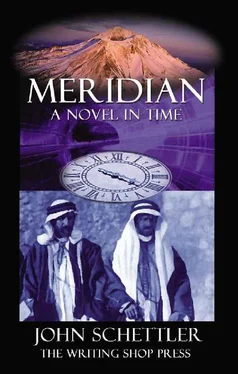Time was like that, he suddenly thought. The idea shot through him like a bolt of lightning and gave him the last critical tenet that had so eluded him in his search for an understanding of time theory. His life was transformed from that moment on. The incident became the founding principle of his theory of time: that all of history’s most crucial events arose from their opposite , from some single moment of utter insignificance that served as the key trigger for the event.
What was it that had led him to the science documentary that night? Somewhere, he knew, there was some insignificant incident that led him to that single split second of insight. He did not know exactly where that moment in time was, but he knew it was there, a single point in time that gave rise to some compelling and truly significant event in the time line of history—a Pushpoint as he came to call it.
Now he was here on a night that should be saturated with significance—the night before the project launch; the final briefing! He was fidgeting with a coffee press and listening to Nordhausen, and trying to keep Maeve content with a decent cup of coffee. Was there another Pushpoint hiding in the insignificance of all these trivial events?
A peal of thunder rumbled in the distance, and the rain pattering on the rooftop began to beat down more heavily. Dorland set the coffee press aside and went over to join the others at the study table. “Well,” he said, “there’s no use wasting any more time tonight.”
“Good,” said Nordhausen looking around for his overcoat.
“Don’t get any ideas about leaving yet,” Dorland cautioned him. “I meant we should get on with the briefing. We can always fill Kelly in when he gets here.”
“I was afraid you were going to say that,” Nordhausen sighed. “I suppose it’s a bit wild out there with this storm blowing through. Let’s get on with it then. I’ll start with the history briefing, unless you have more time theory to discuss.”
“Be my guest,” Dorland proffered a slight bow in the professor’s direction.
“Shakespeare’s Tempest ,” Nordhausen began. “A fine night for the subject, isn’t it? Now, unless Kelly finds something in the numbers to screw things up, our plan remains the same. The temporal locus is the early winter of 1612, at the Globe, of course. Our intention is solely observation. We’re going to watch the play. The Tempest was written in the fall and winter of 1610-11 and probably first produced at court in 1611. This particular event was a special showing at the Globe, probably part of the festivities preceding the marriage of Elizabeth to the Elector Palatine. Oh, we’re going to nose around a bit, but there won’t be any real interaction with the locals.”
“Nose around a bit?” Maeve was immediately on guard. “What exactly is that supposed to mean? You said observation only—remember?”
“Well you don’t expect us to simply take a seat, watch the play and then leave do you? What’s the point of opening the continuum if we don’t learn anything?”
“At this point I’d be satisfied to simply get there and return safely,” said Dorland “If we actually manage to take in a scene or two of the play, all the better.”
“What do you mean, nose around a bit? ” Maeve fixed Nordhausen with those riveting hazel eyes and he squirmed a little as he answered.
“Nothing out of the ordinary,” he started to explain. “I thought we might just have a look about the theatre—at least one of us—while the others enjoy the play.”
“Where?” The tone of Maeve’s voice made it perfectly clear that Nordhausen had better come to the point, and fast.
“Well, there’s been a lot of controversy surrounding the origin of this play,” the professor ventured out onto the ice, choosing his words carefully. “I thought we might find something that would shed light on a few questions, that’s all.”
“What questions?” Maeve was still waiting and Nordhausen took a deep breath and finally let his idea tumble out.
“Source material, for one thing. There is no known source for the story, you see. As far as we know it was one of only two original plots Shakespeare came up with, the other being Love’s Labor’s Lost. There are some, however, who feel he was heavily influenced by the Bermuda Pamphlets, and—”
“This wasn’t in your task list, Professor.” Maeve’s look made it clear that she wasn’t happy.
“Yes it was,” said Nordhausen. “I put it in under observation of grounds and theatre.”
“Bermuda Pamphlets?” Dorland was confused.
“You expect a copy of the Bermuda Pamphlets to just be lying around somewhere for your perusal?” Maeve was on to something now.
“What are you two talking about?” Dorland was only too glad that it was Nordhausen who was going to be the recipient of Maeve’s attention for a while, but he tried to get his footing in the conversation anyway.
Nordhausen sighed and turned to explain. “Nine ships set sail from Plymouth for the colony of Virginia in June of 1609. The new governor of the Colony, Sir Thomas Gates, was on Sea-Venture, commanded by Sir George Somers. Well, the fleet hit bad weather on July 24, a tempest, if you will. Sea Venture was separated from the rest of the ships and was presumed lost at sea. Then, to everyone’s great surprise, the survivors of the ship’s contingent turned up in Jamestown the following May! They were adrift on two makeshift vessels they managed to build during a long sojourn on the isle of Bermuda—thought to be a devil’s island at the time. The reports and letters about the incident reached London in 1610, just before Shakespeare started work on The Tempest. It was very big news, you see, and particularly for Shakespeare.”
“Why is that?” asked Dorland.
“Because he had close relations with the folks who sponsored the expedition in the first place. Some even think he may have had a share in the profits of the planned Virginia Company. In any case, much of what we know about the incident comes from letters and reports that have been loosely called the Bermuda Pamphlets—William Strachey’s letter in particular.”
“I knew you would try to pull something like this,” Maeve was getting angry now. “I won’t allow it, Robert!”
“Oh come on,” Nordhausen tried to pacify her. “I have just as much interest in preserving the continuum as you do—even more, in fact. You know how I feel about the history.”
“Only too well,” said Maeve. “That’s what worries me. Now, I’ll ask you one more time. Just where do you think you might go strolling?”
Nordhausen had a flustered look on his face. There was no getting around her, he knew. Not on the night of the final briefing. He decided he had better come clean and see if he could get Dorland to chime in with something from his time theory to smooth the wrinkle over. “Just a quick peek in the rear offices,” he ventured. “Only one of us—while the others enjoy the play.”
“Whose offices?” Maeve narrowed her eyes, knowing the answer to the question before Nordhausen had a chance to answer. “No, I’m sorry, but I won’t allow it. This was not on your list—at least not specifically, and we can’t run formulae on potential outcomes without exact details. I’m amazed that you would try to pull something like this at the last minute. I won’t hear of it!”
“Whose offices?” Dorland was feeling a bit shipwrecked himself.
“But I won’t be more than a few minutes,” Nordhausen’s voice seemed to plead now. “I’ll just slip away for a moment and take a quick peek at the old man’s study, that’s all. He might have copies of Strachey’s letters there.”
Читать дальше












